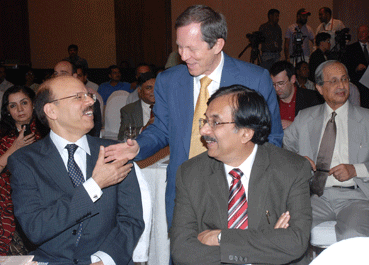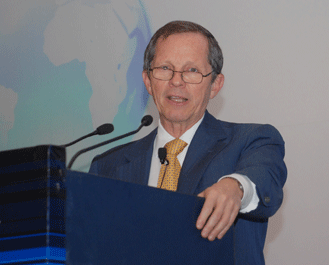

 |
 |
|
| |
||
|
Vol. 8 No. 115 WE COVER THE WORLD Wednesday October 28, 2009 |
|
The Lady Is Air Cargo Americas Next
week when the doors swing open in Miami for the Tenth Air Cargo Americas
International Congress and Exhibition, once again an important cargo
exhibition will gather just off the main runways of Miami International
Airport. Next
week when the doors swing open in Miami for the Tenth Air Cargo Americas
International Congress and Exhibition, once again an important cargo
exhibition will gather just off the main runways of Miami International
Airport.Since 1991 as ACA describes the event: “We offer aviation executives to exchange views, develop strategies to enhance the growth of the air cargo industry in the Americas and showcase the latest products and technologies.” So expect a good solid two-day action packed event filled with Latin and world carriers and buyers of air cargo services punctuated with some discussion sessions and speeches. Air Cargo Americas is put up by The World Trade Center in Miami where Charlotte Gallogly serves as President. This year the IV SeaCargo Americas exposition will also be held in conjunction with the tenth Air Cargo Americas Congress & Exposition. Miami WTC is an organization that puts up all kinds of events to support the fortunes of Miami business and commerce. Central to that operation is outspoken and no-nonsense Charlotte Gallogly. Air Cargo News/Flying Typers salutes Charlotte for her dedication to serving air cargo with an outstanding forum and trade show. The simple truth is that as long as there has been an Air Cargo Americas, the show has been put up by Charlotte except maybe the first one if memory serves. No matter. That Charlotte has almost single handedly pulled this show up by its bootstraps speaks volumes about her strength and determination. Over the years the event has gotten bigger and then smaller; has showcased new carriers coming in and then some that stuck their toe in the water and then never came back. Once an ACA even got caught up in a hurricaine and had to cancel as that storm ripped up Miami and closed everything else in its path for several days. But undeterred and without missing a beat, in 2009 Charlotte is actually the single continuing long distance runner and constant force in USA air cargo events. Shows and organizations come and go. Miami has positioned itself among USA gateways as a force to be reckoned with in and out of Latin America. In that effort Charlotte Gallogly has built Air Cargo Americas into a force that continues to showcase the gateway along with a growing list of other cargo airport operations for air cargo. Under her steady hand Air Cargo Americas has been reliable and steady and ready every two years. During the rest of her time between each Air Cargo Americas, as President of World Trade Center Miami, Charlotte Gallogly directs the management of Miami's oldest and largest trade association ($2.0 million/20 staff) which involves the delivery of products and services to over 1,000 World Trade Center member corporations and over 2,000 international executives. What she brings to the table is an unmatched level of expertise in the Americas to the design and development of leading edge trade information systems directed at furthering two-way trade activities for international companies. Along the way Charlotte has directed a variety of trade development and investment initiatives in Asia, Europe and Latin America. Currently, she serves as Co-Chair of the Association's Committee on Public Relations and Information and the Committee on WTC Standards and Quality, and Committee on Trade Fairs & Trade Marts. Charlotte also dedicates her time to a variety of U.S. and hemispheric advisory committees in the international business arena, including the steering committee for the Summit of the Americas a few years back. Charlotte Gallogly is a force for good who has lent her expertise in and out of air cargo to an expansive list of projects including a number of private sector investments in the real estate area from the development of strip shopping centers to mid-size office buildings. Of course right now she is putting her all into another gathering of air cargo people and companies and for that we can all be grateful. Charlotte truly lifts us all. Charlotte Gallogly, info@worldtrade.org or call (305) 871-7910. Geoffrey Arend |
An
Air Cargo News/FlyingTypers Original Our
exclusive series “Women
In Air Cargo” asks our readers to send some words and a picture
about somebody that you know who is female and has made a difference
in air cargo.
|
Bisignani Calls For
|
 |
 |
| IATA chief (centre) with India’s Director General of Civil Aviation Dr. Nasim Zaidi (left) and Civil Aviation Secretary M. Madhavan Nambiar. |
The International Air Transport
Association (IATA) reiterated its call for a global sectoral approach
led by the International Civil Aviation Organization (ICAO) to handle
aviation’s emissions in the post-Kyoto period.
“We need a global solution that
can encompass all of aviation—incorporating the differing situations
of airlines from developed and developing nations. The best hope of
this is through ICAO which has a proven track record,” said Giovanni
Bisignani, IATA’s Director General and CEO.
In a speech to an event jointly hosted
by The Energy and Resources Institute (TERI) and IATA, Bisignani referred
specifically to the effective work of ICAO in handling the introduction
of quieter aircraft. “ICAO developed a global framework to deal
with noise. The noisiest aircraft were phased out between 1995 and 2002.
The global solution took into account the difficult situation of some
developing nations with an extension to 2005,” said Bisignani.
He pointed out: “IATA’s mission
is to represent, lead and serve the airline industry. In my seven years
as Director General of IATA, environment is the issue that has most
fully matched this mission.”
The IATA chief then went on to outline
“our first task in developing an industry response to climate
change was to build consensus. That was not easy,” he said, “not
because airlines did not care about climate change. Improving fuel efficiency
and environmental performance has always been on the agenda. In the
last 40 years, fuel efficiency improved by 70 percent…our members
were at different stages. Europe was most sensitive because the political
awareness was highest. The U.S. had not ratified Kyoto, so there was
no sense of urgency. And airlines in developing states, including India,
were in a rush to support the economic growth and social benefits that
aviation brings.”
Bisignani’s remarks are particularly
timely as the global climate change debate is increasingly stalled on
the principle of common but differentiated responsibility that underpins
the United Nation’s Framework Convention on Climate Change in
the run-up to climate talks in Copenhagen this December.
IATA defines such a sectoral approach
as
•
Accounting for emissions at a global level, not by state
•
Making aviation fully accountable and pay for its emissions once,
not several times over
•
Giving access to global carbon markets until technology provides
the ultimate solution
“Such a global approach would take
advantage of the aviation sector’s proactive approach to addressing
the issues of climate change. We are the only industry with a united
strategy and targets across the whole value chain. These are tougher
targets than even our regulators are prepared to administer,”
said Bisignani.
Aviation has committed to three sequential targets
•
Improving average annual fuel efficiency by 1.5% to 2020
•
Stabilizing emissions with carbon-neutral growth from 2020
•
An aspirational goal to cut net emissions in half by 2050,
compared to 2005.
Bisignani recently met the UN Secretary
General Ban Ki-moon to present the industry strategy and targets. In
the meeting, the UN Secretary-General commended the aviation industry’s
commitment to contribute to the global fight against climate change
and encouraged that these commitments be followed by concrete actions.
He stressed the importance of addressing emissions from international
aviation and shipping if the world is to achieve its goal of reducing
global greenhouse gas emissions to a level that avoids dangerous climate
change.
Bisignani singled out sustainable biofuels
as an example of optimism in future reductions. “The three biggest
opportunities for emissions reductions are technology, infrastructure
and sustainable biofuels. Of these, sustainable biofuels are the most
exciting because for the first time air transport has the possibility
of an alternative to traditional jet fuel. Our attention is on camelina,
jatropha and algae, which do not compete for land or water with food
crops but have the potential to reduce our carbon footprint by up to
80%. Because they can be grown in almost any soil condition or in salt
water or even waste water they have the potential to create new industries
and livelihoods by bringing sustainable energy production jobs to many
of the least developed parts of the planet,” said Bisignani.
Four test flights with sustainable biofuels
have proven that they meet the technical and safety standards for use
in commercial aviation. Moreover, they can be blended with jet fuel
and used in today’s aircraft and engines.
“Progress is going at a much faster
pace than anybody anticipated. Three years ago sustainable biofuels
were a dream. Now we expect certification no later than 2011,”
said Bisignani.
Bisignani took the opportunity to comment
on the EU’s recently announced policy framework for Copenhagen.
“The next challenge is Copenhagen,” he said, “where
the negotiations will be tough. A global sectoral approach under ICAO
and working with IATA provides the best possibility for aviation to
meet its climate change responsibility as a global industry.”
“The most important development
is their explicit support for a global approach through ICAO. They have
set some targets, which are more political than technical. As such they
are neither credible nor achievable with the timelines described,”
said Bisignani.
“The most important outcome from
Copenhagen for aviation will be agreement to treat aviation as a sector
under the leadership of ICAO and working with industry. This should
be the focus for all governments seeking to effect real reductions in
CO2 from the global aviation sector—from India and China to the
EU and the US. If not, we face the risk of uncoordinated competitive
government taxation that won’t reduce emissions but will be harmful
to global economic development,” said Bisignani.
Tirthankar Ghosh
Brussels Airlines Surges
If there never was a Brussels
Airlines or a Sabena then someone should have invented the airline.
|
|